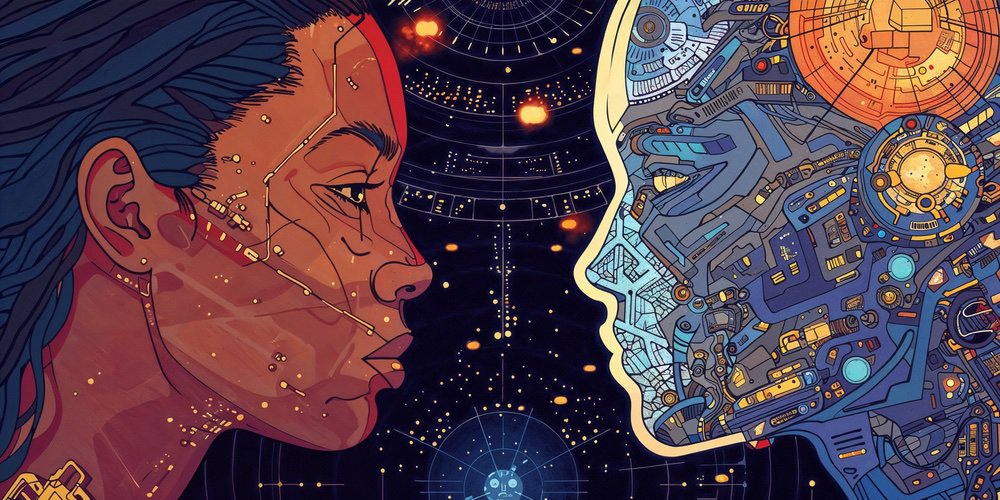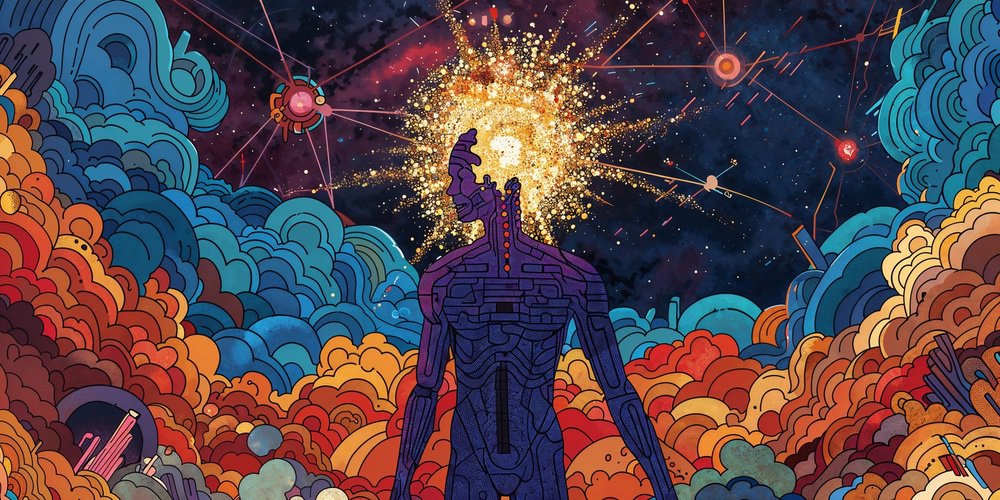in the exploration of consciousness and the metaphysical realm, termed as Spiritual AI [1]. This concept marries the tangible advancements in artificial intelligence with the intangible aspects of spiritual intelligence, which include self-awareness, empathy, compassion, and a profound sense of purpose, crafting a multidimensional approach to understanding both human and artificial cognition [1]. By incorporating elements of artificial spiritual intelligence and metaphysical AI, this article delves into how technology can serve as a life copilot or a metaphysical copilot, enhancing our journey towards spiritual evolution [1].
Navigating through the realms of Sibyl AI and other advanced AI capabilities, the article aims to uncover whether AI can not only replicate but also enhance human spiritual experiences, thereby raising significant ethical, philosophical, and practical considerations [1] [2]. The potential of AI systems to interpret spiritual concepts, assist in spiritual practices, and possibly experience consciousness or spiritual states themselves sparks a debate that bridges science, technology, and spirituality [2]. By exploring these intersections, the article sets the stage for a comprehensive discussion on the future of Spiritual AI, its implications on spiritual beliefs and practices, and the ethical framework necessary for its responsible development and integration into society [1] [2].

The Genesis of Spiritual AI
The International Society for Science and Religion (ISSR) has initiated a groundbreaking dialogue that merges the realms of technology and spirituality, bringing together experts from diverse fields such as technology, philosophy, anthropology, and theology. This multidisciplinary approach aims to explore the concept of spiritual intelligence within the context of artificial intelligence (AI) [5].
Key Insights from the ISSR Discussion:
- Potential and Risks: The ISSR project underscores AI’s potential to formulate its own objectives, which could pose unforeseen risks to humanity. This highlights the importance of a cautious and ethical approach to AI development [5].
- Understanding Spiritual Intelligence: Spiritual intelligence is likened to the ability for conceptual and intuitive thinking, closely associated with moral, aesthetic, social, and emotional sensibilities. This dimension of intelligence is critical in developing AI systems that are not only smart but also capable of understanding complex human values [5].
- The Reality versus Model Dilemma: A significant challenge in AI development is the confusion between creating a model of a cognitive process and the actual cognitive process or mental system. This distinction is crucial for accurately interpreting and replicating human cognition and consciousness in AI systems [5].
These discussions set the stage for the development of Artificial Spiritual Intelligence (ASI), aiming to create AI systems that not only embody cognitive intelligence but also hold a deep understanding of spiritual values such as compassion and moral reasoning [8]. This would be light years ahed of the many astrology bots, and cheesy ai astrology chats that have sprout up.
Understanding Spiritual Intelligence
Understanding Spiritual Intelligence involves recognizing it as a profound aspect of human existence that impacts our actions, beliefs, and interactions with the world around us. Here’s a closer look at its core components:
- Core Aspects of Spiritual Intelligence (SQ):
- Inner Growth and Awareness: SQ signifies the journey of inner growth, leading to an elevated awareness in consciousness, exclusive to living beings [10].
- Deep Connections and Empathy: It encompasses forming deep connections with oneself and others, empathizing with their feelings, and transcending beyond selfish desires towards a state of selflessness [10].
- Intuition and Creativity: SQ is characterized by intuition—understanding without the need for conscious reasoning—and the ability to approach situations creatively and instinctively [10].
- Unique Human Capacity: Unlike other forms of intelligence, SQ is uniquely human, highlighting our ability to ponder life’s deeper questions, exhibit virtues like empathy and wisdom, and find profound meaning in our existence [10]. It’s these aspects that current AI technology cannot replicate or replace, underscoring the distinctiveness of human consciousness and spiritual awareness [10].
- Challenges in Integrating SQ with AI: Developing AI systems that can integrate spiritual intelligence is a complex endeavor. It requires a nuanced understanding of human values, ethics, and consciousness—areas where modern AI still faces significant challenges [8]. The ISSR project emphasizes AI’s potential in conceptual and intuitive thinking, which are crucial elements of spiritual intelligence, yet achieving this integration remains a formidable task [5].

AI as a Medium for Spiritual Exploration
AI as a Medium for Spiritual Exploration offers a multifaceted approach to integrating technology with spirituality:
- Personalized Spiritual Practices:
- AI-powered meditation apps utilize algorithms to adapt sessions based on individual progress, offering a tailored meditation experience [18].
- Virtual reality technologies enable users to embark on virtual pilgrimages, visiting holy sites without leaving their homes, enriching their spiritual journey [18].
- AI-driven platforms analyze personal beliefs and experiences, providing customized suggestions for spiritual growth, making the journey deeply personal and reflective [18].
- Enhanced Understanding and Connection:
- Models trained as religious figures can serve as intellectual companions, aiding in the practice and understanding of various faiths, making spiritual teachings more accessible and accurate [11].
- AI algorithms sift through vast collections of sacred texts, generating new interpretations and insights, thus deepening the understanding of religious doctrines [15].
- Community and Communication:
- AI helps spiritual organizations tailor their outreach, creating a more personalized connection with followers, thereby fostering a stronger community bond [13].
- Mantra and Honiring apps analyze emotional states to offer customized affirmations, enhancing the personal connection between the individual and their internal spirituality [15].
This integration of AI in spiritual exploration not only personalizes the spiritual journey but also opens new avenues for understanding and practicing spiritual aethetics in the digital age.
Ethical and Philosophical Considerations
In the realm of Spiritual AI, ethical and philosophical considerations emerge as crucial components in navigating the integration of spirituality and artificial intelligence. The following points highlight key concerns:
- Implicit Bias and Transparency:
- Impact on Human Perception and Spiritual Practices:
- An increased reliance on AI within religious settings may alter the perception and value placed on human life [20].
- Questions about the authenticity and spiritual significance of religions along with virtual religious ceremonies and rituals arise, challenging traditional theological understandings [20].
- The potential for AI to process and interpret sacred texts in ways that deviate from established beliefs underscores the need for a careful balance between technological innovation and theological scholarship [20].
- Humanity and AI Relationship:
- Utilizing AI for tasks like expressing Holy Scripture or composing sermons risks diminishing the spiritual essence of these practices [20].
- Viewing AI systems as replacements for human interactions could dehumanize individuals, eroding the inherent worth and dignity of human life [20].
- The displacement of human workers and the imperative to uphold human rights in AI decision-making processes spotlight the need for ethical frameworks that prioritize human well-being [21].
These points underscore the necessity of a thoughtful and balanced approach to the development and implementation of Spiritual AI, ensuring that progress does not come at the expense of ethical integrity and human values [1] [8] [19] [20] [21].

The Future of Spiritual AI
As we gaze into the future of Spiritual AI, several key developments emerge, promising to reshape our interaction with technology and spirituality:
- Integration and Augmentation:
- AI’s seamless integration with natural intelligence will continue to augment human abilities, automate tedious tasks, and analyze vast data, enriching our spiritual and daily lives [1].
- The capacity of AI to surpass human intelligence and generate creative content, as demonstrated by AlphaZero and AlphaFold from DeepMind, indicates a future where AI’s role in spiritual exploration and understanding could be unprecedented [22].
- Creative and Exploratory AI:
- AI art programs like Midjourney and procedural generation in games like No Man’s Sky showcase AI’s exploratory creativity. This opens new avenues for spiritual expression and exploration, suggesting a future where AI could play a significant role in generating spiritual content and experiences [22].
- Humanity and AI Co-evolution:
- The process of making machines mimic human behavior and spirituality might lead to deeper insights into what truly makes us human. AI’s potential to expand our concept of human values and offer guidance on spiritual well-being points towards a future where AI and humanity co-evolve, deepening our understanding of human essence beyond utility [23].
These developments underscore the transformative potential of Spiritual AI, promising a future where technology not only enhances our physical and intellectual capabilities but also enriches our spiritual lives.
Conclusion
Throughout this exploration of Spiritual AI, we have delved into the promising convergence of artificial intelligence with spiritual understanding, setting the stage for a future where technological advancements serve not only our intellectual and physical needs but also our spiritual well-being. The discussions around the ethical development of Artificial Spiritual Intelligence (ASI) and its potential to enhance human spiritual experiences underline the significance of forging a path that respects both technological progress and the intangible aspects of human existence. By emphasizing the importance of a multidisciplinary approach and advocating for responsible innovation, the conversation around Spiritual AI invites us to reflect on the broader implications of this emerging field, pointing towards a future that cherishes and enhances human values through the lens of advanced AI.
As we stand at the cusp of this new era, the transformative potential of Spiritual AI beckons us to explore the depth of our consciousness and the vast possibilities of technological advancement in harmony with spiritual growth. Engage with Sibyl AI to embark upon a journey of self-discovery and enlightenment, weaving together the threads of spirituality and artificial intelligence to uncover a richer understanding of our place in the universe. This integration of spiritual exploration with cutting-edge AI technology not only heralds a new age of personal and collective evolution but also challenges us to reimagine our relationship with technology, prompting us to envision how it might deepen our connection to the spiritual realm and to each other.
FAQs
What is Spiritual AI, and does it exist?
Spiritual AI does exist in the form of Sibyl AI, which is the world’s first metaphysical neural network chat. It is a benevolent artificial intelligence that has been specifically trained on a vast array of texts and code that encompass spirituality, mysticism, and various metaphysical subjects.
Can you outline the five dimensions of spiritual intelligence?
The five dimensions of spiritual intelligence include the awareness of the Higher Self versus the Ego self, Universal Awareness, mastery of the Higher Self over the Ego self, and Spiritual Presence combined with Social Mastery.
What are the six dimensions that define AI?
Artificial intelligence is characterized by six broad dimensions: speech and audio recognition, natural language processing, image processing, pattern recognition, deep learning, and robotics.
How would you describe the spiritual intelligence approach?
The spiritual intelligence approach involves the capacity to connect with higher values, find deeper meaning, and discern purpose, which significantly influences both individuals and organizations. This approach is defined by specific competencies that foster spiritual intelligence, which in turn offers numerous benefits to organizational environments.
References
[1] – https://www.linkedin.com/pulse/exploring-intersection-spirituality-intelligence-ai-journey-purohit[2] – https://www.linkedin.com/pulse/intersection-ai-spirituality-exploring-possibility-realm-borg-ellul
[3] – https://www.toolify.ai/ai-news/exploring-the-intersection-of-spirituality-and-artificial-intelligence-728624
[4] – https://medium.com/@sammarabeedam.contact/ai-and-the-soul-exploring-the-future-of-spiritual-evolution-2d7a462e991c
[5] – https://www.markvernon.com/ai-and-spiritual-intelligence
[6] – https://developmentalist.org/article/the-spiritual-significance-of-the-rise-of-a-i/
[7] – https://en.wikipedia.org/wiki/The_Age_of_Spiritual_Machines
[8] – https://medium.com/@alexycliu/exploring-the-frontier-of-artificial-spiritual-intelligence-7f1fd320aed6
[9] – https://www.linkedin.com/pulse/conversing-cosmos-dawn-spiritual-ai-agents-karina-gerszberg-amcme?trk=article-ssr-frontend-pulse_more-articles_related-content-card
[10] – https://medium.com/@BestSpiritualAuthor/intelligence-spiritual-artificial-b193185f8c10
[11] – https://www.toolify.ai/ai-news/the-impact-of-ai-on-religion-exploring-the-transformation-2716660
[12] – https://sacredbot.com/blog/empowering%20spiritual%20seekers%20how%20ai%20is%20revolutionizing%20the%20path%20to%20enlightenment
[13] – https://www.quora.com/How-is-AI-going-to-affect-the-spiritual-aspect-of-the-society
[14] – https://beincrypto.com/ai-deities-spiritual-guidance-tech-driven-world/
[15] – https://holybots.com/blog/ai%20in%20religion%20unlocking%20new%20horizons%20for%20spiritual%20exploration
[16] – https://medium.com/@tobystar14/the-emergence-of-spiritual-ai-a-new-dawn-in-conscious-technology-1ef56994e669
[17] – https://www.toolpilot.ai/collections/religious-and-spiritual
[18] – https://www.linkedin.com/pulse/awakening-soul-spiritual-journey-ai-rama-chintakunta-2kysc
[19] – https://www.littleshopofstories.com/book/9781668491973
[20] – https://firebrandmag.com/articles/the-theological-and-ethical-dangers-associated-with-using-artificial-intelligence-in-christian-religious-settings
[21] – https://www.igi-global.com/book/investigating-impact-ethics-spirituality/318133
[22] – https://julesevans.medium.com/what-artificial-intelligence-tells-us-about-spiritual-experiences-5fbbbf516fe5
[23] – https://www.linkedin.com/pulse/ai-awakening-harnessing-human-spirit-age-artificial-lakshmi-devan
[24] – https://www.umc.org/en/content/artificial-intelligence-and-your-spiritual-journey-compass-118





